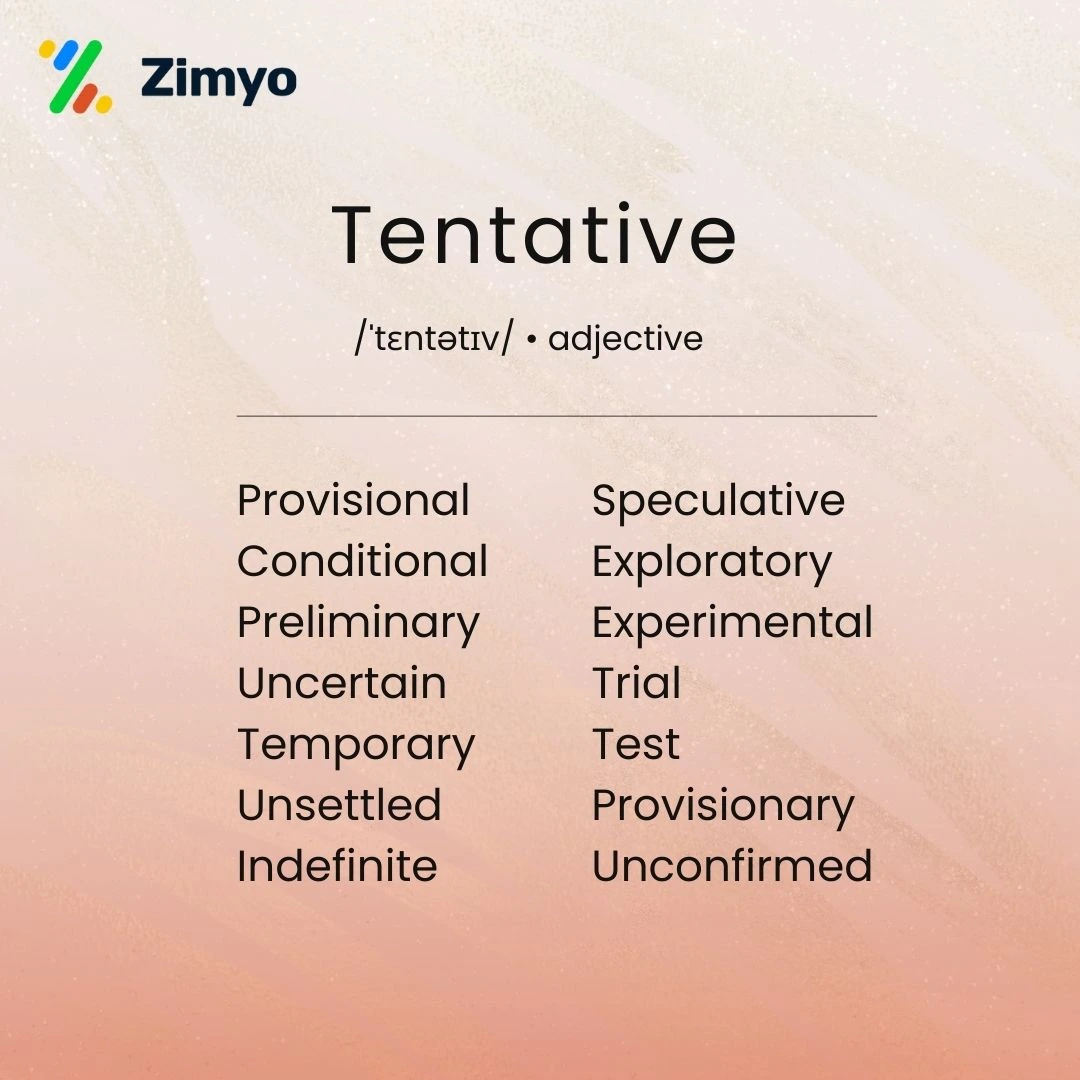How to Define Tentative?
Have you ever made a decision that wasn’t final yet? Maybe you gave someone a tentative or temporary job offer, or you made a provisional tentative agreement that still needed approval. So, what exactly does tentative mean, and how does it apply to your work life? Further, Let’s understand tentative meaning and explore its concept in HR, business, and beyond.
Tentative Meaning
Tentative meaning in English is a term used when something is not yet final, definite, or confirmed. Moreover, being tentative means an action, plan, or decision that is subject to change depending on certain conditions.
For example, a company might extend an unconfirmed job offer to a candidate. Thus, pending the completion of a background check. Although it’s not a firm decision yet, it indicates the company’s interest.
Overall, in simpler terms, think of it like saying, “We’re considering it, but it’s not final yet.”
Tentative Synonyms
Finding synonyms for tentative? So, Here are a few words with similar meanings:
- Provisional
- Conditional
- Preliminary
- Uncertain
- Temporary
- Unsettled
- Indefinite
- Speculative
- Exploratory
- Experimental
- Trial
- Test
- Provisionary
- Unconfirmed
- Subject to Confirmation
- Tentativeness meaning
Therefore, these words all convey the idea of something not final or subject to change.
Provisional Examples Real Life
To understand tentativeness meaning better, let’s look at a few common situations:
- Tentative Job Offer: A candidate receives an offer that depends on the outcome of reference checks or background verification. Besides, this is a temporary offer, as we haven’t set it in stone. Overall, it affects multiple features.
- Tentative Agreements: During union negotiations, there is space for experimental agreements. Also, the agreements with tentative date meaning are not considered official until they have been approved by all parties involved.
- Tentative Plans: If a project is in its early stages, the timeline may be uncertain. Meaning, it’s subject to change as more information comes in.
Further, the term “tentative” can also refer to a type of credit where funds are not actually released. Instead, it represents a promise, bond, or agreement indicating that the money will be transferred on a specified date after a complete review of all financial statements.
What Makes Temporary Decisions Important?
Why are temporary or experimental actions so important in business? Because they allow for flexibility and adjusting in uncertain situations. Moreover, they provide space for review and adjustments before any final commitment. Here’s why they matter:
- Room for Changes: Indefinite decisions give room to adjust plans as circumstances evolve. For instance, if market conditions change, a trial strategy might be modified accordingly.
- Clear Communication: If you’re making an exploratory decision, it’s crucial to communicate clearly to avoid miss communication. So, everyone should know the decision is provisional and might change.
- Risk Management: What if there are situations like collective bargaining or company-wide changes? Then unsettled agreements allow all parties to carefully review the terms before agreeing.
Types of Temporary Decisions
Temporary decisions come in many forms. Here are a few you might encounter:
- Provisional Job Offers
When a candidate receives a conditional job offer, they know it’s not final until certain conditions meet. Therefore, it becomes official, background checks, reference verification, medical tests, or documentation reviews must be completed. - Provisional Agreements
In union negotiations, an agreement is often preliminary until both sides sign the deal. Also, think of it like a handshake, but still in review. Overall, it serves as a working draft that leads discussions while keeping all aligned. - Project Deadlines
Project managers might speculate about a timeline when they have not fully defined the scope. It gives teams the flexibility to adjust as they get more clarity. Furthermore, the project’s scope becomes clearer, the deadlines can be adjusted accordingly. - Company Policies
Sometimes, a company might introduce a provisionary policy subject to employee feedback and further evaluation. Ultimately, this allows leadership to evaluate real-world impact, gather insight, and make better long-term decisions.
How to Handle Experimental Decisions in Business?
While experimental actions or decisions are often necessary, managing them well is key. How do you manage these effectively?
- Communicate Clearly: Always inform others that the decision is temporary and may change. Further, For example, when offering a tentative promotion, let the employee know the final decision depends on certain factors.
- Set Expectations: It’s essential to be transparent about when the final decision will be made. Afterwards, this approach ensures that individuals are not left with uncertain timelines.
- Review Regularly: If the decision is still under trial, keep reviewing it. Additionally, situations evolve, and what was yesterday might need to be confirmed today.
How to Define Tentative in HR and Business?
In HR, tentative agreements and actions are quite common. Besides employers might make conditional job offers or enter tentative date meaning & discussions before making the final call. Further, Here’s how to define tentative in an HR setting:
- Job Offers: A tentative job offer is extended with the understanding that it may change.
- Performance Reviews: Managers might give tentative feedback to employees before finalizing their evaluations.
- Salary Negotiations: Overall salary packages might be tentative until both sides come to an agreement.
Conclusion
In summary, the word tentative meaning describes actions, decisions, agreements that are not yet final. Whether in HR, business, or personal life, understanding the role of exploratory actions helps you navigate uncertainties. Overall, clear communication and understanding that things are subject to change allow better decision-making and planning.
Therefore, next time you hear the word, you’ll know it refers to something in progress. So, something that could change, improve, or evolve based on further review or new information. Additionally, always keep in mind that actions are required in adapting to challenges. Hence, giving way to flexible approaches in any organization.
Frequently Asked Questions (FAQs)
What is the meaning of tentative?
Tentative meaning refers something that is not yet finalized or confirmed. Also, It reflects uncertainty or a provisional state, often used to describe plans, schedules, or agreements that are subject to change.
How do you use 'tentative' in a sentence?
You can use tentative to express uncertainty or a lack of finality. Further let’s look at an example below-
Example: “The meeting is scheduled for Monday, but the time is tentative.”
What is tentative synonym?
Common tentative synonyms include – provisional, conditional, preliminary, uncertain, experimental, trial, and unconfirmed – all implying something temporary or subject to change.
Is tentative the same as temporary?
Not exactly. While both imply non-permanence, tentative emphasizes uncertainty or being subject to confirmation, whereas temporary focuses more on a limited time frame.
What does 'tentative schedule' mean?
A tentative schedule & tentative time meaning refers to a preliminary timeline that may change. Moreover, it is subject to confirmation and often used when details are still being finalized or explored.
When can i use tentative?
Choose it when to describe something you are unsure or hesitant about. Further can use it in context that includes non decisive result.
What is the tentative period?
A tentative period means a provisional time that has not been finalized or confirmed. Moreover, it means the schedule is still subject to adjustment and might still be changed when pending conditions or approvals are met, prior to its finalization.





